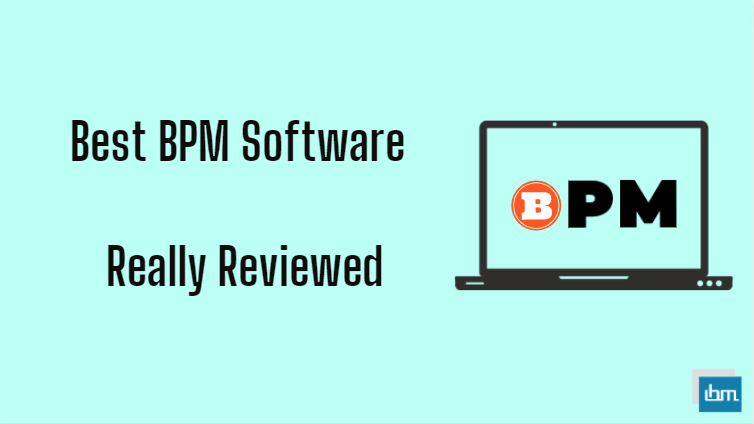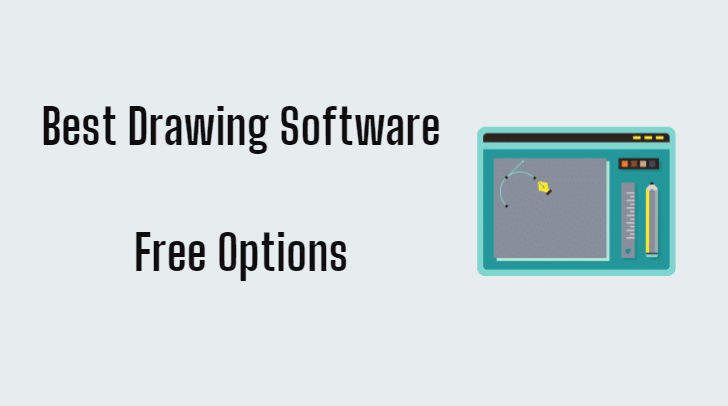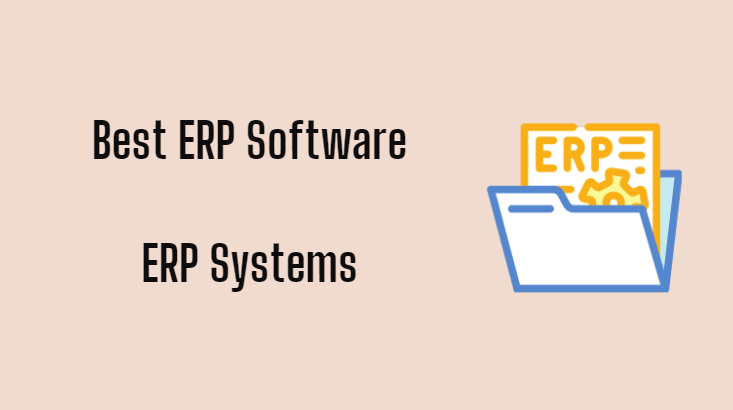Best Affordable BPM software for Small Businesses. Want to jump straight to the answer? The BPM Software for most people is Zoho Creator, Monday.com, or Nintex.
In the fast-paced world of modern business, efficiency and optimization are paramount. Business Process Management (BPM) software emerges as a strategic solution, enabling organizations to analyze, model, automate, and continuously improve their workflows.
The best BPM software empowers businesses to streamline processes, enhance collaboration, and drive operational excellence. Let’s dive into the realm of BPM software and discover how it transforms the way businesses operate.
Efficient workflows are the backbone of successful organizations. BPM software enables businesses to identify bottlenecks, optimize processes, and achieve operational excellence.
I want to show you the top Affordable BPM software for Small Businesses, available on the market today, reviewed in deep depth, and help you decide which is best for your business.
What Is The Best Affordable BPM software for Small Businesses.
Here are my picks for the Best Affordable BPM software for Small Businesses to use this year.
1. Zoho Creator.
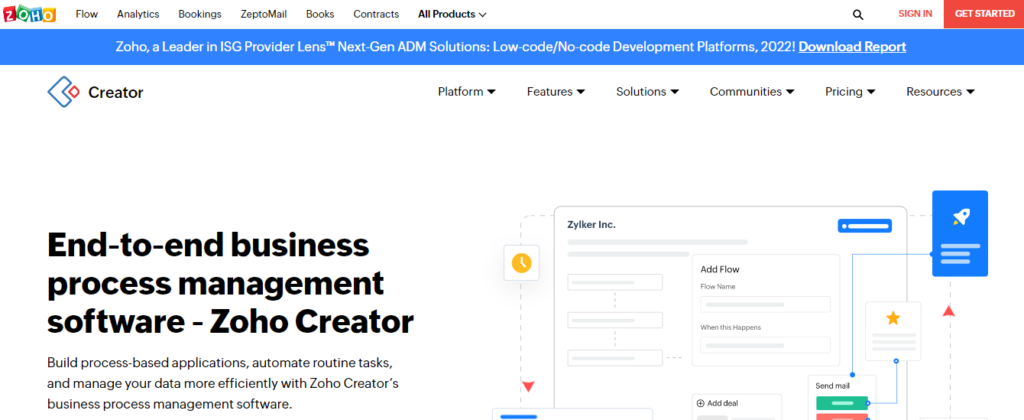
while Zoho Creator is primarily known as a low-code application development platform, it effectively serves as a BPM software solution by enabling process automation, custom application creation, integration, collaboration, and more. Its versatility makes it a valuable tool for businesses seeking to streamline their operations, automate workflows, and manage processes effectively.
Zoho Creator is a comprehensive low-code application development platform that goes beyond just BPM (Business Process Management) software. It enables users to create custom applications, automate workflows, and manage business processes efficiently. Here’s an overview of how Zoho Creator serves as a BPM software solution.
Key Features:
- Process Automation: Zoho Creator allows you to automate various business processes by creating custom workflows. These workflows define the sequence of tasks, approvals, and actions required to complete a process.
- Custom Applications: The platform enables you to design and build custom applications tailored to your specific business needs. These applications can range from simple data entry forms to complex business process management systems.
- Drag-and-Drop Interface: Zoho Creator features a user-friendly drag-and-drop interface that lets you design forms, workflows, and interfaces without the need for extensive coding knowledge.
- Workflow Designer: The platform provides a visual workflow designer that allows you to map out the flow of tasks, conditions, and triggers within your business processes.
- Integration Capabilities: Zoho Creator integrates with various other Zoho applications and third-party tools, allowing you to connect your business processes with other software systems.
- Data Management: The platform provides tools for data collection, storage, and management, making it easy to capture and analyze information relevant to your processes.
- Collaboration: Zoho Creator enables collaboration by allowing users to access, contribute, and collaborate on processes and applications in real time.
- Reporting and Analytics: The platform offers reporting and analytics features that provide insights into the performance of your processes, helping you make informed decisions.
- Mobile Access: Zoho Creator applications are mobile-responsive, ensuring that you can manage and monitor your processes from any device.
- Approval Workflows: The platform supports creating approval workflows, enabling efficient review and authorization processes for various tasks.
- Notifications and Alerts: Zoho Creator allows you to set up notifications and alerts to keep stakeholders informed about the status of processes and tasks.
- Data Security: The platform emphasizes data security, providing role-based access control and data encryption to protect sensitive information.
- Customizable Dashboards: Zoho Creator lets you create customized dashboards to monitor the progress and performance of your business processes.
- Technical Support: Zoho Creator typically offers customer support to assist users in designing, implementing, and troubleshooting their business processes.
Pricing:
You can easily get started at Zoho Creator with a free sign-up. If you want more features besides free sign-up. So you will have to step up to the paid plan. If this plan does not match your personal reasons or business, I would recommend you to drop a mail to their customer support or you can contact them directly as per availability.
2. Monday.com.
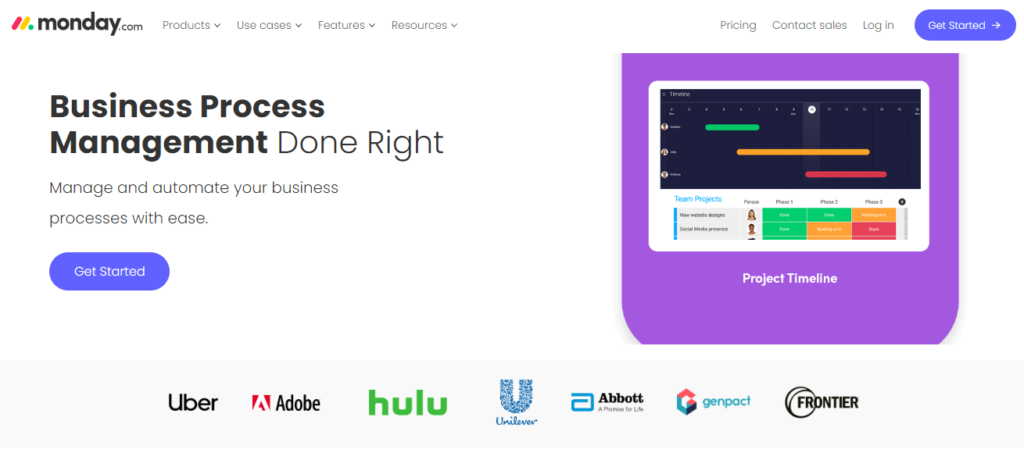
while Monday.com is a versatile work operating system, it effectively functions as BPM software by offering tools for process design, automation, collaboration, integration, and more. Its user-friendly interface and customizable features make it a valuable solution for businesses seeking to streamline their operations, automate workflows, and manage processes efficiently.
Monday.com is a versatile work operating system that provides robust features to facilitate Business Process Management (BPM) and workflow automation. While it’s not exclusively BPM software, Monday.com offers a comprehensive platform to design, optimize, and manage various business processes. Here’s how Monday.com serves as a BPM software solution.
Key Features:
- Process Design and Visualization: Monday.com offers a visual platform where you can design, map, and visualize your business processes using customizable boards, columns, and automation recipes.
- Workflow Automation: The platform allows you to automate repetitive tasks and processes by setting up custom automation rules. This enhances efficiency and reduces manual intervention.
- Custom Workflows: Monday.com lets you create custom workflows by defining the sequence of tasks, deadlines, dependencies, and approvals required to complete a process.
- Task Assignment and Tracking: You can assign tasks to team members, set deadlines, and monitor progress within each step of your business processes.
- Collaboration: Monday.com provides collaboration features that allow team members to collaborate, share updates, and communicate within the context of specific tasks or processes.
- Integration Capabilities: The platform integrates with various third-party tools and apps, enabling seamless data exchange and communication across your tech stack.
- Data Management: Monday.com offers data collection, storage, and management capabilities, allowing you to capture and analyze information relevant to your processes.
- Reporting and Analytics: The platform provides reporting features to track the performance of your processes, identify bottlenecks, and make data-driven decisions.
- Approval Workflows: You can set up approval processes within your workflows, ensuring that tasks move through designated approval stages before completion.
- Notifications and Reminders: Monday.com offers notifications and reminders to keep team members informed about task updates, approaching deadlines, and other important events.
- Mobile Accessibility: With mobile apps, team members can access, update, and manage processes from anywhere using their smartphones or tablets.
- Customization: The platform allows you to customize the structure of your boards, columns, and automation rules to match your specific BPM needs.
- Data Security: Monday.com emphasizes data security by providing role-based access control and permissions, ensuring that sensitive information is protected.
- Technical Support: Monday.com typically offers customer support to assist users in setting up, optimizing, and troubleshooting their processes.
Pricing:
You can easily get started at Monday.com with a free sign-up. If you want more features besides free sign-up. So you will have to step up to the paid plan. If this plan does not match your personal reasons or business, I would recommend you to drop a mail to their customer support or you can contact them directly as per availability.
3. Nintex.

Nintex is a comprehensive BPM software platform that excels in automating, optimizing, and managing business processes. With features like workflow automation, integration, reporting, and an intuitive interface, it offers a robust solution for organizations seeking to improve operational efficiency, enhance collaboration, and achieve better control over their processes.
Nintex is a robust Business Process Management (BPM) software platform that empowers organizations to automate, optimize, and manage their business processes efficiently. It provides a comprehensive set of tools to design, execute, and monitor workflows, enabling businesses to enhance productivity and streamline operations. Here’s how Nintex serves as a BPM software solution.
Key Features:
- Workflow Design and Automation: Nintex offers a visual interface to design and automate workflows, allowing users to define the sequence of tasks, approvals, and actions required for different business processes.
- Process Modeling: The platform provides process modeling tools to create detailed process maps that visually represent the steps, dependencies, and interactions within a workflow.
- Drag-and-Drop Workflow Designer: Nintex’s intuitive drag-and-drop designer allows users to create complex workflows without the need for extensive coding knowledge.
- Workflow Templates: Nintex offers a library of pre-built workflow templates for various industries and use cases, helping organizations get started quickly.
- Workflow Automation: Users can automate routine and manual tasks, reducing human error, enhancing efficiency, and ensuring consistent process execution.
- Integration Capabilities: Nintex integrates with a wide range of third-party systems and applications, facilitating data exchange and streamlining information flow.
- Task Assignment and Tracking: The platform enables task assignment, tracking, and monitoring, ensuring that team members are aware of their responsibilities and deadlines.
- Approval Workflows: Nintex supports the creation of approval workflows, allowing designated stakeholders to review and approve tasks or documents at various stages.
- Data Collection and Management: Nintex provides forms and data collection capabilities, allowing users to gather and manage information efficiently within workflows.
- Reporting and Analytics: The platform offers reporting and analytics features to track the performance of workflows, identify bottlenecks, and make data-driven decisions.
- Notifications and Alerts: Nintex allows users to set up notifications, reminders, and alerts to keep stakeholders informed about workflow progress and status.
- Mobile Accessibility: With mobile apps, users can participate in workflows, access forms, and monitor tasks from their mobile devices.
- Customization: Nintex offers flexibility in designing workflows to match specific business needs and requirements.
- Data Security: The platform emphasizes data security with role-based access control, ensuring that sensitive information is accessible only to authorized users.
- Technical Support: Nintex typically provides customer support to assist users in designing, implementing, and troubleshooting their workflows.
Pricing:
You can easily get started at Nintex with a free sign-up. If you want more features besides free sign-up. So you will have to step up to the paid plan. If this plan does not match your personal reasons or business, I would recommend you to drop a mail to their customer support or you can contact them directly as per availability.
4. Pega.
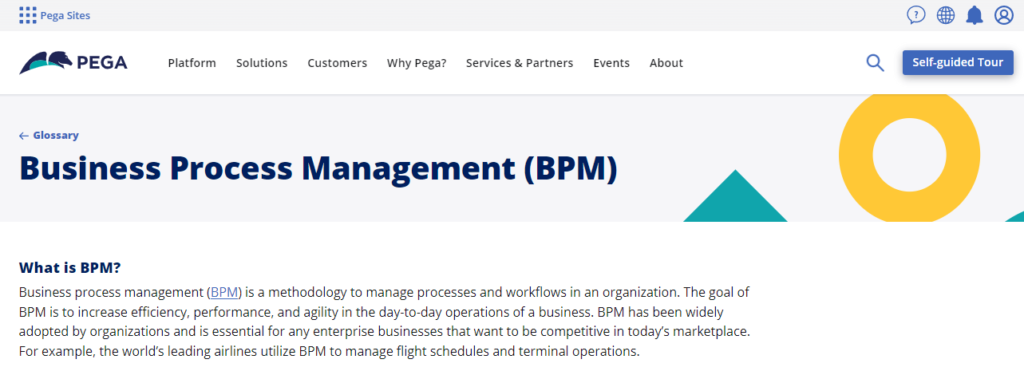
Pega is an advanced BPM software platform that excels in automating, optimizing, and managing complex business processes. With features like dynamic case management, predictive analytics, integration capabilities, and user-centric design, Pega provides a robust solution for organizations seeking to achieve operational efficiency, deliver exceptional customer experiences, and drive digital transformation.
Pega is a leading Business Process Management (BPM) software platform that empowers organizations to design, automate, and optimize complex business processes. With its advanced capabilities, Pega enables businesses to streamline operations, enhance customer experiences, and achieve operational excellence. Here’s how Pega serves as a powerful BPM software solution.
Key Features:
- Process Design and Modeling: Pega offers visual tools to design and model business processes using a user-friendly interface. Process maps provide a clear overview of workflows, tasks, and decision points.
- Workflow Automation: Pega enables the automation of end-to-end workflows by defining rules and logic that guide the flow of tasks, approvals, and interactions within a process.
- Business Rules Management: The platform allows users to define and manage complex business rules that govern how processes are executed, ensuring consistency and compliance.
- Dynamic Case Management: Pega’s case management capabilities empower organizations to manage dynamic and unpredictable processes by adapting to changing conditions and requirements.
- Integration Capabilities: Pega seamlessly integrates with various systems, applications, and databases, enabling efficient data exchange and real-time information sharing.
- User Experience: Pega emphasizes user experience by providing intuitive interfaces, role-based access, and personalized views that improve usability and productivity.
- Predictive Analytics: The platform leverages predictive analytics to anticipate and optimize process outcomes, helping organizations make informed decisions.
- Real-time Monitoring: Pega offers real-time monitoring and reporting dashboards that provide insights into process performance, bottlenecks, and KPIs.
- Collaboration: Pega enables collaboration by allowing users to work together on tasks, share information, and communicate within the context of a process.
- Advanced Reporting: The platform provides advanced reporting and analytics features that enable data-driven decision-making and process optimization.
- Case Lifecycle Management: Pega supports the management of cases from initiation to resolution, ensuring that cases are efficiently handled and tracked.
- Data Security: Pega prioritizes data security with granular access controls, audit trails, and encryption, ensuring sensitive information is protected.
- Mobile Accessibility: Pega offers mobile apps that allow users to participate in processes, access data, and perform tasks on the go.
- Customization: Pega is highly customizable, enabling organizations to tailor workflows, interfaces, and rules to match their unique business requirements.
- Technical Support: Pega typically offers comprehensive technical support and resources to assist users in implementing and managing their BPM processes.
Pricing:
You can easily get started at Pega with a free sign-up. If you want more features besides free sign-up. So you will have to step up to the paid plan. If this plan does not match your personal reasons or business, I would recommend you to drop a mail to their customer support or you can contact them directly as per availability.
5. IBM Blueworks Live.

IBM Blueworks Live is a cloud-based BPM software solution that focuses on process visualization, documentation, collaboration, and analysis. Its user-friendly interface and collaboration features make it a valuable tool for organizations seeking to improve their business processes, enhance transparency, and foster continuous process improvement.
IBM Blueworks Live is a cloud-based Business Process Management (BPM) software solution designed to help organizations streamline their business processes, visualize workflows, and collaborate on process improvement initiatives. It offers tools for process modeling, documentation, and analysis to drive operational efficiency and transparency. Here’s how IBM Blueworks Live serves as a BPM software solution
Key Features:
- Process Discovery and Modeling: Blueworks Live allows users to document, model, and visualize their business processes using a user-friendly interface. This includes mapping out process steps, decisions, and interactions.
- Process Collaboration: The platform supports collaborative process design and improvement by enabling teams to work together in real time, sharing insights, feedback, and suggestions.
- Process Documentation: Users can create detailed process documentation, making it easier to understand and communicate how different processes work within the organization.
- Process Analysis: Blueworks Live provides tools to analyze process data, identify bottlenecks, inefficiencies, and areas for improvement, helping organizations optimize their operations.
- Workflow Visualization: The platform offers visual representations of process flows, making it simpler for stakeholders to understand and identify potential areas of enhancement.
- Version Control: Blueworks Live includes version control features, allowing users to track changes made to process models over time.
- Integration Capabilities: The platform can integrate with other IBM products and external systems, facilitating data exchange and enhancing end-to-end process visibility.
- Collaboration and Communication: Blueworks Live supports communication and collaboration among team members by enabling them to discuss process-related matters within the platform.
- Approval Workflows: The platform allows users to define approval workflows for process changes and improvements, ensuring that changes are properly reviewed before implementation.
- Process Documentation Export: Users can export process documentation and models in various formats, making it easy to share information with stakeholders.
- Process Governance: Blueworks Live helps establish process governance by offering features for access control, permissions, and data security.
- Process Improvement: The platform supports ongoing process improvement by providing insights that drive better decision-making and optimizations.
- Data Security: IBM Blueworks Live emphasizes data security, offering features like role-based access control and encryption to protect sensitive information.
- Technical Support: IBM typically provides technical support and resources to assist users in using and getting the most out of Blueworks Live.
Pricing:
You can easily get started at IBM Blueworks Live with a free sign-up. If you want more features besides free sign-up. So you will have to step up to the paid plan. If this plan does not match your personal reasons or business, I would recommend you to drop a mail to their customer support or you can contact them directly as per availability.
6. Process Street.
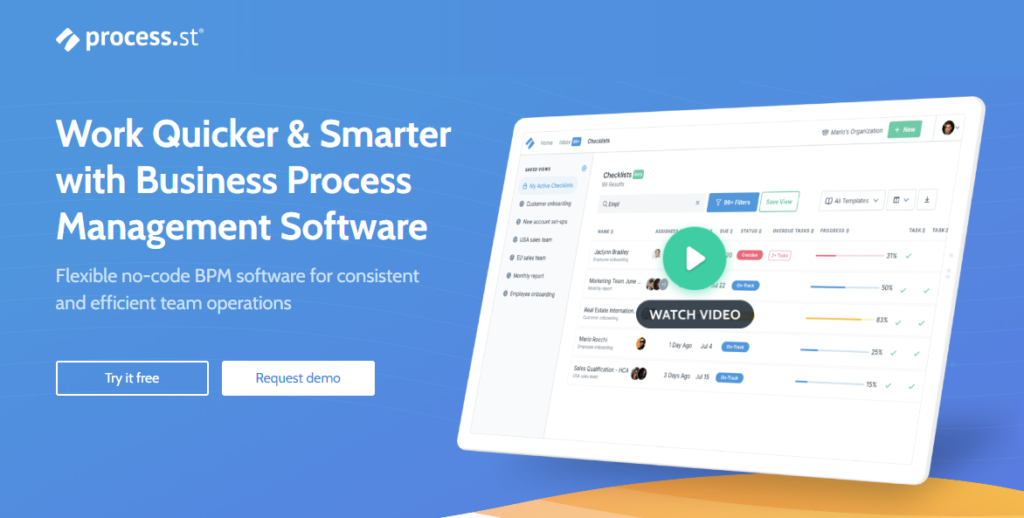
Process Street is a user-friendly BPM software platform that excels in process design, automation, collaboration, and documentation. With its intuitive interface and robust features, it provides a valuable solution for organizations seeking to improve operational efficiency, standardize processes, and achieve better control over their workflows.
Process Street is a Business Process Management (BPM) software platform that specializes in providing a user-friendly solution for creating, managing, and optimizing business processes. It offers a range of features that enable organizations to design, automate, and streamline their workflows effectively. Here’s how Process Street serves as a BPM software solution
Key Features:
- Process Design and Mapping: Process Street allows users to visually design and map out their business processes using an intuitive drag-and-drop interface. This includes defining tasks, decisions, and dependencies.
- Workflow Automation: The platform enables the automation of recurring tasks and processes by creating templates with predefined steps and instructions.
- Checklists and Workflows: Users can create dynamic checklists and workflows that guide team members through each step of a process, ensuring consistency and accuracy.
- Collaboration: Process Street supports collaboration by allowing team members to collaborate on checklists and processes, share feedback, and track progress.
- Approval Workflows: The platform enables the setup of approval workflows, ensuring that tasks or documents go through designated review and approval stages.
- Task Assignment and Tracking: Users can assign tasks to specific team members, set due dates, and monitor progress in real time.
- Process Documentation: Process Street provides a centralized repository for storing process documentation, making it easy to access and share information.
- Integration Capabilities: The platform integrates with various third-party tools and applications, enhancing the interoperability of your tech stack.
- Data Collection and Forms: Process Street offers customizable forms to collect data during processes, allowing users to gather and manage information efficiently.
- Reporting and Analytics: The platform provides reporting and analytics features to track process performance, identify bottlenecks, and make data-driven decisions.
- Mobile Accessibility: Process Street’s mobile app allows users to access, complete, and collaborate on processes using their smartphones or tablets.
- Customization: Users can customize templates, workflows, and checklists to match their specific business requirements and processes.
- Process Governance: Process Street supports process governance through access controls, permissions, and audit trails, ensuring data security and compliance.
- Technical Support: Process Street typically offers customer support and resources to assist users in designing, implementing, and optimizing their business processes.
Pricing:
You can easily get started at Process Street with a free sign-up. If you want more features besides free sign-up. So you will have to step up to the paid plan. If this plan does not match your personal reasons or business, I would recommend you to drop a mail to their customer support or you can contact them directly as per availability.
7. ProcessMaker.

ProcessMaker is a versatile BPM software platform that excels in process design, automation, collaboration, and analytics. Its robust features and intuitive interface make it a valuable solution for organizations seeking to enhance operational efficiency, standardize processes, and achieve greater control over their workflows.
ProcessMaker is a comprehensive Business Process Management (BPM) and workflow automation software platform that empowers organizations to design, automate, and optimize their business processes. It offers a range of tools and features to streamline operations, improve efficiency, and enhance collaboration. Here’s how ProcessMaker serves as a BPM software solution.
Key Features:
- Process Design and Modeling: ProcessMaker allows users to design and model complex business processes using a visual interface. This includes mapping out process steps, decisions, and interactions.
- Workflow Automation: The platform enables the automation of workflows by defining rules, triggers, and actions that guide the flow of tasks and approvals within a process.
- Form Creation: ProcessMaker provides tools to create custom forms and electronic documents that are used within workflows to collect and manage data.
- Task Assignment and Tracking: Users can assign tasks to specific individuals or groups, set due dates, and monitor task progress in real time.
- Collaboration and Communication: ProcessMaker facilitates collaboration by allowing users to communicate, share feedback, and collaborate on tasks within the context of a process.
- Integration Capabilities: The platform integrates with various third-party systems, applications, and databases, enabling seamless data exchange and enhancing process efficiency.
- Approval Workflows: ProcessMaker supports the creation of approval workflows, ensuring that tasks and documents move through designated approval stages.
- Reporting and Analytics: The platform offers reporting and analytics features that provide insights into process performance, bottlenecks, and key metrics.
- Customization: Users can customize workflows, forms, and processes to match their unique business requirements and industry-specific needs.
- Mobile Accessibility: ProcessMaker’s mobile app allows users to participate in workflows, access forms, and manage tasks on the go.
- Process Optimization: The platform supports ongoing process optimization by identifying areas for improvement and providing data-driven insights.
- Data Security: ProcessMaker emphasizes data security with user access controls, encryption, and audit trails, ensuring data protection and compliance.
- Process Monitoring: Users can monitor the status and progress of workflows in real time, enabling better decision-making and resource allocation.
- Technical Support: ProcessMaker typically provides customer support and resources to assist users in deploying, using, and optimizing their BPM processes.
Pricing:
You can easily get started at ProcessMaker with a free sign-up. If you want more features besides free sign-up. So you will have to step up to the paid plan. If this plan does not match your personal reasons or business, I would recommend you to drop a mail to their customer support or you can contact them directly as per availability.
Conclusion.
For small businesses in India, selecting the right Business Process Management (BPM) software is crucial for optimizing operations and enhancing productivity.
The best affordable BPM solutions available today offer a blend of user-friendly interfaces, essential features, and cost-effectiveness, making them ideal for smaller teams.
Platforms like Zoho Creator, Monday.com, or Nintex stand out for their intuitive design and robust capabilities, allowing businesses to automate workflows and streamline processes without requiring extensive technical expertise.
Pega and IBM Blueworks Live also provide excellent low-code options, enabling users to customize their processes easily while keeping costs manageable.
Additionally, Process Street and ProcessMaker offer comprehensive BPM solutions that cater to the specific needs of small businesses, ensuring scalability as the company grows.
These tools not only facilitate process mapping and automation but also enhance collaboration among team members, ultimately leading to improved efficiency.
By leveraging these affordable BPM software options, small businesses can effectively manage their operations, reduce manual errors, and focus on strategic growth.
The availability of free trials allows users to explore different platforms before making a commitment, ensuring they find the right fit for their unique needs.
Overall, investing in the right BPM software can significantly impact a small business’s success, enabling it to thrive in a competitive market while maximizing resources.

